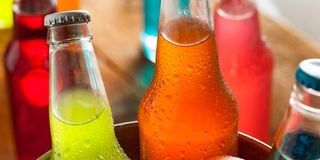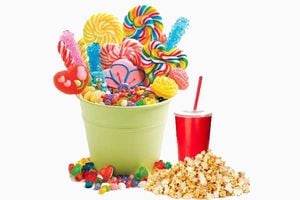
Soft drinks affect energy levels, causing one to have spikes and crashes.
Grabbing a soda on a scorching day is totally understandable, but every single day? Now, that is a bit harder to justify.
Lifestyle spoke to Kenyans who are addicted to soft drinks. They drink it every day, with every meal. They are finding it hard to kick the habit, yet it is impacting their health. A majority have several bottles of soft drinks in their refrigerators and more in the pantry.
I drink two litres 5 to 7 days

Wankio Phenice.
Wankio Phenice remembers the first time she started drinking soda.
“I was an intern in Homa Bay around 2015. It was very hot, so I got into this habit of drinking a cold soda to cool down,” says the 30-year-old.
On any given day, she cannot do without a bottle of Coke and Fanta blackcurrant.
“I drink it in the evening. It is just a routine; I'll be watching a movie while drinking soda,” she says.
Wankio says she not only buys the sodas in bulk for home consumption but also gets them on the go, especially if she is working outside the office.
“I always buy two-litre bottles that last for five to seven days,” she says. A glass of soda, she says, always boosts her mood.
My guilty pleasure combo

Peninah Mwangi
For Peninah Mwangi, a mixture of soft drinks gives her an unexplained thrill. From 2018, she could drink a mixture of Fanta and Coca-Cola.
She was off sodas for about four years but has picked up the habit again in March this year.
“I cannot eat food, especially dinner, without soda. So, I drink soda every day in the evening,” she says.
Peninah says her current favourite combo is Fanta black currant and Sprite. “I put a bit more Sprite than blackcurrant, which ends up tasting like Vimto,” she says.
What makes soda irresistible, she says, is the fizziness.
“It may be a health hazard, but when it is cold and then it’s going down your throat, those gas bubbles...it’s so refreshing,” she says.
Unlike most Kenyans, whose breakfast involves either tea or coffee, Peninah can take leftover soda from the previous night as her daybreak meal.
“It gives me a boost of energy, sugar rash...it does a number, especially swallowing it continuously and it's cold; pure bliss,” the 25-year-old says.
Anything can kill you
For 13 years straight, Kallen Mboshe has been drinking a bottle of soda every day. When concerns about the health effects are raised, she quickly responds with a laugh, saying, ''If you're talking about it killing me... (laughs) anything can kill you."
The 56-year-old cannot recall the exact moment she began consuming soda in excess but says she drinks it whenever she feels like it.
“Be it in the morning or afternoon, as long as I feel thirsty, I will go for it. You can't miss Coke in my house and sometimes in my handbag,” she says, “I love Coke because of its flavour; it's more fun to drink it than water or juice, and I don’t like coffee that much.”
Over the years her children have raised concerns about her overconsumption of soft drinks, to which she responds, “I have been taking Coke for more than a decade now, and I am okay, I guess.”
Additionally, Kallen notes that a bottle of soda boosts her energy levels, admitting that the habit grew over the years. “You know, just like those people who are addicted to alcohol, I am addicted to soda. It starts slow, but now it's more of a habit.”
The rabbit hole that soda took me
Bethsheber Brenda, 52 years old, knows too well the taste and quench a soda gives, especially when served cold. But she says it is an addiction that can drive you into a rabbit hole.
“I used to like coffee, as my preferred beverage, but I realised I could not sleep after taking it so I opted for soda,” she says.
Two years ago, Bethsheber started taking soda in excess—daily. She says a cold bottle of Diet Coke would cut it for her. “I would drink it either during lunchtime or when I needed a snack. I loved Diet Coke because it had less sugar but would buy Coke and Fanta blackcurrant if my shopkeeper did not have the Diet Coke,” she says.
However, two months ago, Bethsheber turned over a new leaf. She says her move was necessitated by high sugar levels.
“Nowadays I take water but I still miss the taste of soda so when I crave it, I take a lot of water.”
No meal without soda, to none at all

Bernard Akama.
Bernard Akama, 40, found himself taking soda in excess when he started living alone at the age of 20. While growing up, soda was deemed a luxury, so he vowed to drink it once he was able to earn his own money.
“Also, since I have never taken alcohol, I would take soda as a relaxation drink,” he says.
How often was he drinking soda?
“Anytime. In the morning, as long as it is there…I would drink soda after my tea. I wake up, and I greet my body with Coke. There is no meal or snack I would take without soda. A minimum 500-millilitre bottle,” he says.
While Bernard preferred passion flavoured soda and Sprite, a cold Coke was what he struggled not to drink.
As his soda drinking morphed into an addiction, so did his children’s love for soda. He says, his fridge would never miss soda and he always budgeted for it.
“We’d buy a minimum of eight-two liter bottles and this is minus other soft drinks. We can reduce the cartons of milk but take soda. The 20-litre jerrican of water would stay without a refill because no one is drinking water," he says.
For 20 years, Bernard would greet the fridge as the first thing once he entered the house and take at least two glasses of cold Coke, “just to welcome me home.”
“Then maybe change from my work clothes then sit down with a two-litre bottle,” he says.
Was he sharing the two-litre bottle?
“No! No! No! No sharing…that is why we bought more than eight bottles and other soft drinks.”
In Bernard's home, the eight-two litres of soda would be finished in three days. “If after three days there is soda and you didn't congratulate me, then you'd be very wicked,” he says and lets out a laugh.
It did not help that everyone around him enabled him.
“Everywhere people knew there must be Coke for me. So, one time we visited someone in Malindi and we picked her up along the way…I asked for water but she brought me a one-litre bottle of Coke and a bottle of water for my wife,” he says.
But early last year, he realised he was adding weight.
“I would feel pain in my joints and pant a lot," he says.
While it was not easy to quit soft drinks, Bernard admits that many times he fell off the trail, but was not drinking as much as he had previously.
Read: The dangers of taking too much soda
“It was gradual, but it was intentional. I did not fight it in a way of ‘I won't buy it or take it’ even if I saw it, and I have to take it—it must be in small quantities. Two, I resolved in my mind that soda is not my enemy; it's just that it is not helping me anymore and I have goals I have to achieve and can't if I'm taking it…so, I looked at it like, ‘Thank you... I have had a good time, but it is time to divorce you.”
As a replacement, Bernard started drinking freshly squeezed fruit juice. To those struggling with soft drink addiction, Bernard says, “ It is not adding value to your health at all. So better stop now.”
Nutritionists' nuggets
Joy Ouma, a clinical nutritionist and dietitian at Aga Khan University Hospital, says that soft drinks affect energy levels, causing one to have spikes and crashes. She explains, “The high sugar content in soft drinks leads to a quick spike in energy, followed by a crash, affecting mood stability and energy levels.”
Additionally, there are immediate health risks of excessive soft drink consumption. One can either get obesity, type 2 diabetes, cardiovascular, kidney stress or injury, dental diseases like cavities, tooth sensitivity, or erosion of the tooth enamel. Also, they are prone to dehydration or issues with digestion such as acid reflux, bloating, indigestion and excess gas.
Do soft drinks have any nutritional content? “They are empty calories. Soft drinks provide no essential nutrients, meaning they're calorie-rich but nutrient-poor, leading to malnutrition if consumed in large quantities.”
Additionally, Ms Ouma says that diet soft drinks which contain artificial sweeteners are equally harmful to one’s health. “The sucralose aspartame and saccharin lead to increased health risks such as inflammation. Increased cravings lead to increased calorie intake and weight gain, or obesity, insulin resistance, and glucose intolerance. Also, they may alter the gut microflora, contributing to digestive issues or malabsorption,” she says.
Is there a demographic that is more vulnerable to the negative effects? "Yes. High sugar intake can lead to early onset of obesity, Type 2 diabetes, dental issues, and poor eating habits in children and adolescents. For pregnant women, excessive soda intake during pregnancy can increase the risk of gestational diabetes (GDM) which can affect both maternal and foetal health. And the elderly are more susceptible to bone loss and osteoporosis, heart diseases.”
Looking to reduce/eliminate?
But it is not all doom, Ms Ouma shares that those willing to reduce soft drinks intake can try healthy snacking like fruits - either wholesome or blended, eat nuts, or take yogurt or milk.
Secondly, they can slowly reduce consumption to avoid withdrawal symptoms especially if it's an addiction. “Substitute or replace sodas with flavoured water, soups, and herbal tea. Increase awareness of why and when you crave soft drinks, and address those emotional or habitual cues,” she adds.
Also, the soft drinks addict can identify the triggers that prompt soda intake, for instance being in social gatherings, and try to limit and eventually avoid them in the long run. Finally, Ms Ouma infers that soft drink addicts can be educated on the long-term health risks associated with soft drinks, which may reinforce their motivation to quit.










